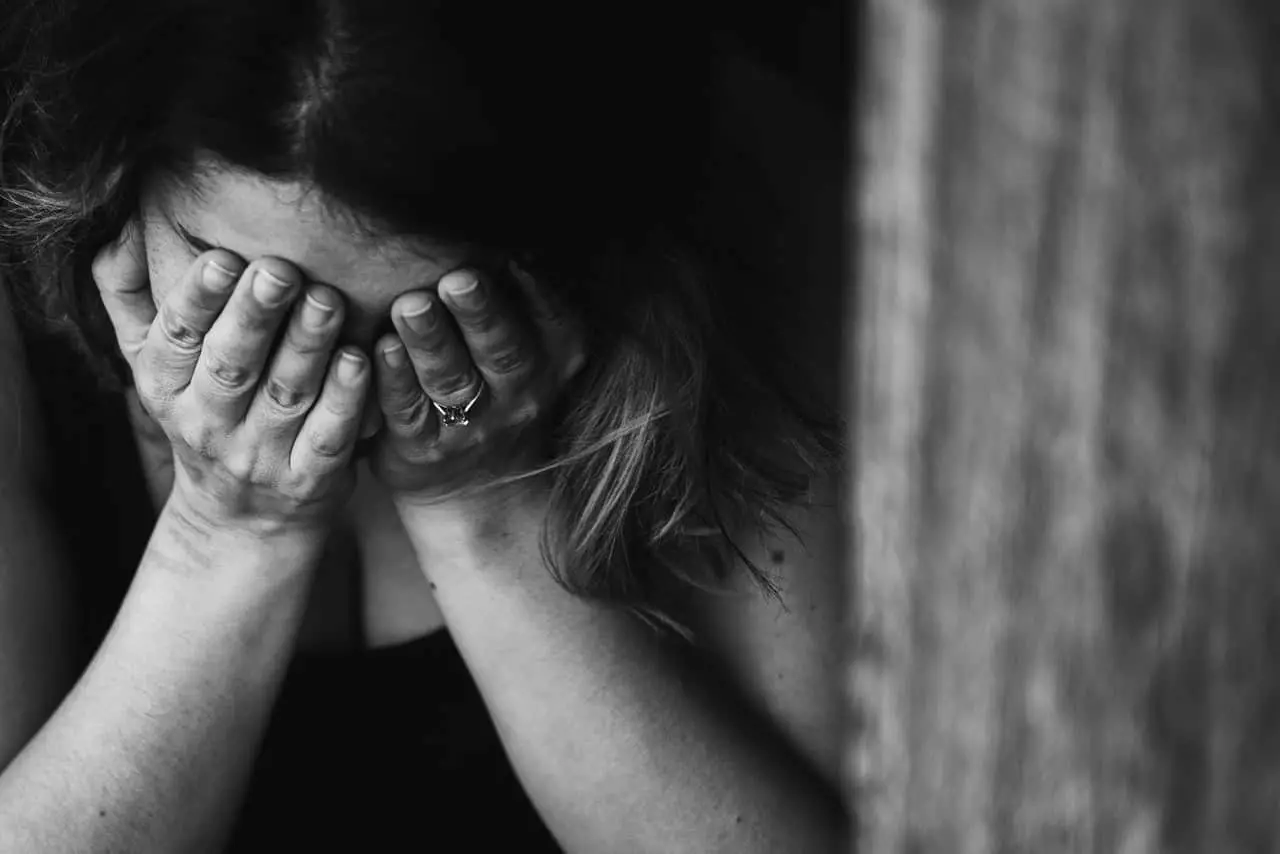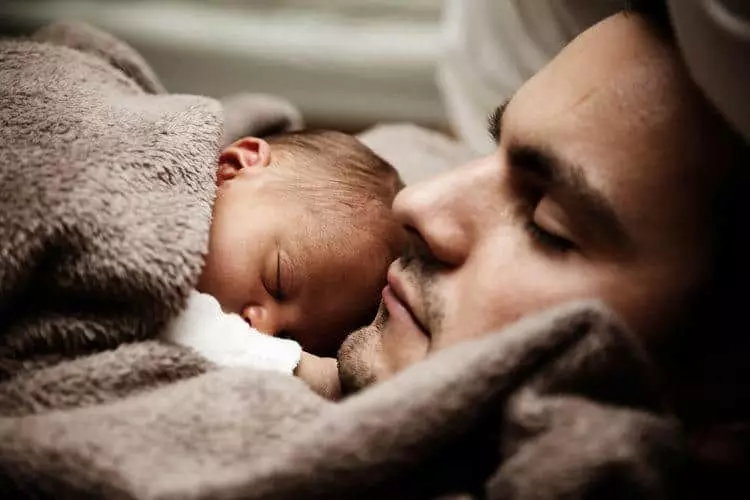Postpartum depression is a very frequent phenomenon among modern mammies. After all, pregnancy and childbirth strongly affect the overall health of the physical and psychological health, often not the most positive way. Therefore, the new mother in the risk group of such a cunning disease, as depression.
But how to understand where the edge ends just bad mood, fatigue and serious psychological disorder begins - I propose to talk on this topic in this material.

Not depression, but baby blues
Find out what awaits you today - a horoscope for today for all zodiac signsBy numerous subscribers requests, we have prepared an accurate horoscope application for a mobile phone. Forecasts will come for your zodiac sign every morning - it is impossible to miss!
Download free: Horoscope for every day 2020 (Available on Android)
In our society, people often do not understand what real depression, calling this formal word, manifested by a degraded mood, fatigue and irritability.
But, according to statistics, the listed symptoms inherent in 2 out of 3 new women. It reaches the greatest severity to 3-5 days after childbirth. A total of a couple of days to several weeks can continue.
Psychotherapists came up with a term to designate such a state of "postpartum baby blues" (or simply "Babi-Blues"). Inseuting people often confuse baby blues and postpartum depression, although in reality these are two different concepts.
So Baby Blues is not some serious disorder and not medical pathology, which means that its treatment is not required. He does not interfere with the young mammy to fully monitor the baby and will disappear independently without extraneous interventions.
How to determine what your baby blues do you have? This phenomenon is accompanied by characteristic features:
- excessive sentimentality;
- sadness;
- flexibility;
- aggressiveness;
- strong internal voltage;
- At times, the woman is in the depressed mood;
- It may experience various sleep disorders (to fall asleep with difficulty, sleep becomes sensitive, often wakes up at night, the next morning does not feel rested).
Postpartum depression symptoms
In most cases, the development of postpartum depression occurs after several months from the date of birth. At the same time, as a rule, it is preceded by a prolonged postpartum blues.
It is very important to identify in time or a young mother's symptoms of the postpartum depression, which manifests itself as:
- sharp drops of mood;
- permanently repressed emotional state;
- Increased federation;
- an increase or, on the contrary, a catastrophic decrease in appetite;
- insomnia or constant drowsiness;
- total weakness, high fatigue;
- difficulties in rapprochement with the baby;
- distance from their loved ones and relatives;
- loss of interest in favorite classes in the past;
- Great irritability, uncontrolled outbreaks of anger;
- obsessive fear to be a bad mother;
- difficulties with the performance of their daily duties;
- sense of inferiority, guilt, shame;
- impaired concentration of attention;
- constant anxiety, panic attacks;
- Things about to harm yourself or baby;
- Thoughts of death or desire to commit suicide.

Of course, you will probably answer if postpartum depression or baby blues can only have a psychotherapist. To which it is necessary to contact if the negative states have been dragged, you can no longer cope with them on your own.
And even more so it is worth seriously concerned if your condition every day becomes worse. Do not neglect the alarming "calls", but urgently contact the qualified help.
Why is postpartum depression develop?
Today, no one can answer this question with 100% confidence. First, because every specific case is unique. A, secondly, because postpartum depression is usually provoked by a combination of emotional and physical reasons.The most common of them are as follows:
- Changes in hormonal background . After the birth of the child in the female body there is a decrease in the number of pregnancy hormones - progesterone and estrogen. This factor often provokes changes in emotional state. In addition, there is a decrease in other hormones, such as thyroid. In this connection, fatigue arises, lethargy, depression and a broadcast.
- The inability to sleep normally . The body after the exhausting process of childbirth strongly needs recovery. But here the new test falls - daily and every minute concern about screaming and ever something of the infant baby. It is not surprising that young mammies suffer from constant lack of sleep and cannot lead themselves. And due to chronic lack of sleep, physical discomfort arises, a sense of fatigue, which can lead to depressive disorder.
- Emotional tension . The appearance of a child is a strong stress for women and cardinal changes in her life. Her physical appearance has changed, perhaps, a young mother learned to identify himself in a completely new role. Often it seems that life came out from under control, you can not manage it anymore. And if you add more a sense of constant anxiety for the baby here, we get a mechanism for the development of postpartum depression.
At the same time, those women who are in the risk group turn out to be
- previously suffered from depressive disorders (after childbirth or simply);
- their relatives faced with such a state or any other form of depression;
- Over the past 12 months, they experienced serious stressful events that could not touch the pregnancy;
- Faced with breastfeeding problems;
- They had a "special" kid;
- They experience a sharp lack of support from their man;
- In the family an unstable financial situation.
What is dangerous postpartum depressive disorder?
Most women, being depressed after childbirth, are excessive concern about the well-being and well-being of a newborn. They may invent a huge number of different fears, bad thoughts, "cheating yourself", which is very harmful.

In addition, postpartum depression prevents the young mother to provide full care to the baby. In the depressed emotional state, it cannot not be what to create a harmonious psychological situation, but even just effectively follow him physically. As a result, the child from the first days of appearance does not receive an adequate attitude towards himself.
What further problems are postpartum depression, if you do not start it in time?
- It provokes a baby hyperela;
- leads to unhealthy symbiotic relations between mother and child;
- sometimes, on the contrary, causes a loss of emotional communication with the newborn;
- The child due to the wrong action of the mother can grow daffidss;
- may suffer from psychosomatic disorders;
- In the family constantly occur "random" household injuries, both moms and baby.
How to deal with depression after childbirth?
If the oppressed state after childbirth did not pass itself, and it was delayed, his symptoms are exacerbated every day - it is necessary to seek help to a psychotherapist or psychiatrist. It is not necessary to engage in self-medication of serious states.
The following are recommendations, as a woman to behave after childbirth, so that the postpartum depression does not visit it:
- Adhere to the most healthy lifestyle . This item includes healthy, balanced nutrition, rejection of harmful meals, alcohol and cigarettes, as well as regular physical activity (the same walks with a baby with a stroller, if the weather is good).
- Restore forces to sleep fully . Between washing dishes and an hour of dining sleep, choose the last option. Remember that a full holiday is that you are now vital.
- Reduce the plank of overpriced expectations . Stop trying immediately lead yourself to the "ideal" form or become a super-mother. Unhealthy perfectionism always comes only to harm, and not benefit.
- Make your life easier . Think about how to minimize spending energy for cooking and care for the baby. For example, if you are hard to cook every day - do food in large volumes so that it remains also for tomorrow.
- Contact help, taking it with gratitude . If you have insufficiently close helpers - Mom, grandmothers, and the spouse always works, do not neglect the small help from the side. For example, ask a girlfriend a little to look after the baby, while you can even relax and sleep. Any help from the side for you is now very important, it must be taken, expressing sincere thanks to it.
- Take care of yourself . Mom will be able to fully take care of her baby only when she herself is filled with energy, glows from happiness and love. And what will be able to give a baby exhausted mother, with a rugged right eye? When she is needed care and energy. Therefore, in no case, do not place the cross and ensure proper filling: a hot bath, massage, aromatherapy, at least a quick jogging in the search for a new dress, the experience of your favorite hobby - all this must be present in the life of a young mummy.
- Talk a lot . Termination of social life and full home routine often creates the impression that mom and child are in a state of isolation. This in turn causes moral suffering from sociable women who are not used to sitting at home. Fortunately, there is always a way out: for new mammies it can be like communication on the phone with relatives and loved ones and communication through the Internet, visiting thematic forums where many burning questions are raised, the experience of parental experiences.
- Express your emotional experiences to others. . Do not keep everything in yourself, because the woman emotional constipation acts very badly. Look for support from those who already have grown babies or, like you, just know all the delights of motherhood.
- Delegate duties . Agree with my husband, in order to approach the baby, when he pays, change the diaper or wash him. Do not take everything only on yourself, because you both have become parents. The husband should also participate in this process.

How to help a young mother to overcome the postpartum depression?
And these are the tips for the spouse or relatives of the mammies, which was in the state of the postpartum disorder of the psyche. How can I help her?
- Be sure to maintain it emotionally, express your sincere sympathy.
- Take on some of the responsibilities for the care of newborn.
- Support a woman in her any endeavors and initiatives.
- Give her to feel that she can safely relax, sleep until you look after the baby.
- Do not make it solve problems on your options, if it considers otherwise.
- Discard any psychological manipulations, in no case do not cause fault in it and other negative emotions.
- Discuss and clearly designate certain relaxes on the day when mommy can fully pay attention to himself to her beloved so that no one bothers her at that time.
- And, perhaps, the most important thing is to envelop her sincere love, let it feel that it is flawlessly good and beautiful even with a couple of extra kilograms and she does not have to be "perfect" to enjoy the long-awaited maternal happiness.
